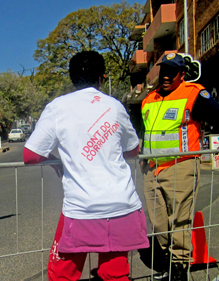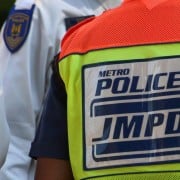|
Getting your Trinity Audio player ready...
|
 Corruption Watch met with senior officials from the City of Joburg recently to advocate for urgent and stronger action against corruption and bribery in the Johannesburg Metropolitan Police Department (JMPD).
Corruption Watch met with senior officials from the City of Joburg recently to advocate for urgent and stronger action against corruption and bribery in the Johannesburg Metropolitan Police Department (JMPD).
The meeting was a follow up on the April launch of Corruption Watch’s ‘No more tjo-tjo campaign’ and the release of ‘The law for sale’ report.
The drive, which called on motorists to reject bribery on the roads, was underpinned by five recommendations. One of the proposed actions was getting all traffic cops to wear name tags and identify themselves at all times before engaging with motorists.
Corruption Watch held the discussion with Joburg city manager Trevor Fowler and JMPD chief Chris Ngcobo, among others.
“It appears the city manager and the JMPD chief have taken our recommendations seriously. A strategy to strengthen and enhance the city’s anti-corruption efforts has been drafted and we were informed that it would be presented to the Mayoral Committee before it is made public,” said Corruption Watch executive director, David Lewis.
The strategy shown to Corruption Watch responds to every recommendation and outlines actions the city will take to respond to corruption and bribery.
Lewis added, however, that it was not enough for the city to just come up with a strategy: “We want to see real change in the way the traffic cops treat motorists. We want to see the cops wearing name tags and identifying themselves as they are required to do by law.”
In the run-up to the meeting Corruption Watch appealed to its fans on Facebook and Twitter for their questions to the city and these were presented during the discussion.
Some of the public’s comments and suggestions were:
- Will the city name and shame convicted offenders, perhaps on the Corruption Watch website or in a newspaper column to deter people in future?
- How can people to be educated better to understand the city’s bylaws?
- All councillors and senior officials should be asked to publicly sign the Corruption Watch pledge.
- There must be clear consequences for offenders, for example lose your job, criminal charges, recover losses where applicable.
- Implement a monitoring system, accessible to the public and journalists, to measure the extent of cases and outcomes.
- No councillor or official should be allowed to conduct business with the City of Joburg – is this in the city’s employment contracts and code of conduct?
- How many cases bribery and corruption cases have been investigated so far and what is the success rate in processing and punishment
- How will the city encourage and protect whistleblowers?
Corruption Watch will continue to monitor how the city addresses corruption and bribery involving the JMPD.
It will focus on the administration’s response to the following recommendations:
- JMPD and the metro begin to acknowledge the scale and depth of corruption in the JMPD.
- JMPD officers be required to wear identification whenever they are on duty and that failure to do so should be grounds for summary dismissal.
- The ability of the public and JMPD officers to report corruption in the JMPD be strengthened and that a reporting system be set up independent of the JMPD.
- Field integrity testing be instituted as a mechanism for detecting corruption.
- The metro’s mayor lead a campaign directed at members of the public and the JMPD reminding them that bribery is a criminal offence.







